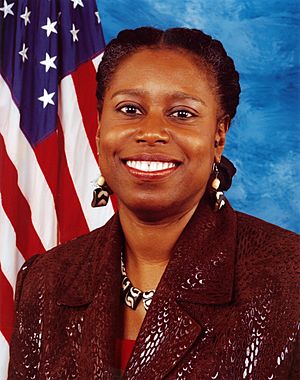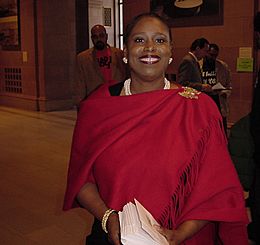Cynthia McKinney facts for kids
Quick facts for kids
Cynthia McKinney
|
|
|---|---|
 |
|
| Member of the U.S. House of Representatives from Georgia |
|
| In office January 3, 2005 – January 3, 2007 |
|
| Preceded by | Denise Majette |
| Succeeded by | Hank Johnson |
| Constituency | 4th district |
| In office January 3, 1993 – January 3, 2003 |
|
| Preceded by | Constituency reestablished |
| Succeeded by | Denise Majette |
| Constituency | 11th district (1993–1997) 4th district (1997–2003) |
| Member of the Georgia House of Representatives from the 40th district |
|
| In office January 9, 1989 – January 3, 1993 |
|
| Preceded by | Barbara H. Couch |
| Succeeded by | Steven C. Clark |
| Personal details | |
| Born |
Cynthia Ann McKinney
March 17, 1955 Atlanta, Georgia, U.S. |
| Political party | Independent (2020–present) |
| Other political affiliations |
Democratic (1973–2007) Green (2007–2020) |
| Spouse | Coy Grandison (divorced) |
| Children | 1 |
| Parent |
|
| Education | University of Southern California (BA) Tufts University (MA) Antioch University (PhD) |
Cynthia Ann McKinney (born March 17, 1955) is a former American politician. She served six terms in the United States House of Representatives as a member of the Democratic Party. She was the first African American woman to represent Georgia in the House.
After leaving the Democratic Party, she ran for president in 2008 as the candidate for the Green Party. In 2020, she ran for vice president.
McKinney also served in the Georgia House of Representatives from 1988 to 1992.
Contents
- Early Life and Education
- Political Career and Activism
- Awards and Honors
- Personal Life
- See also
Early Life and Education
Cynthia McKinney grew up in Atlanta, Georgia. Her mother, Leola McKinney, was a retired nurse, and her father, Billy McKinney, was a law enforcement officer and a state representative.
Her father was an activist in the Civil Rights movement. He often protested against unfair policies, sometimes carrying young Cynthia on his shoulders. He was elected as a state representative after the Voting Rights Act helped more people vote.
McKinney studied international relations at the University of Southern California, earning a bachelor's degree in 1978. She then earned a master's degree in Law and Diplomacy from Tufts University in 1979. In 2015, she received her Ph.D. from Antioch University.
Before becoming a politician, McKinney worked as a high school teacher and university professor. She taught political science at Agnes Scott College and Clark Atlanta University.
Political Career and Activism
Serving in the Georgia House of Representatives (1988–1992)
Cynthia McKinney's political journey began when her father suggested her as a candidate for the Georgia state house in 1986. Even though she was living in Jamaica at the time, she received about 20% of the votes.
In 1988, McKinney ran for the same seat and won. This made her and her father the first father and daughter to serve in the Georgia House of Representatives at the same time.
Representing Georgia in the U.S. House (1993-2003)
In 1992, McKinney was elected to the United States House of Representatives. She represented Georgia's newly created 11th District, which had a majority of African American residents. She was the first African American woman to represent Georgia in the House. She was re-elected in 1994.
In 1995, the U.S. Supreme Court changed the district boundaries. McKinney's district was renumbered as the 4th District. She was easily elected from this new district in 1996 and re-elected two more times.
During her first time in Congress, she served on important committees, including those dealing with Foreign Affairs, Banking and Finance, and Armed Services. She often spoke about American foreign policy.
Concerns About the 2000 Presidential Election
McKinney and other members of the House raised concerns about the electoral votes from Florida in the 2000 United States presidential election. However, their objection was not supported by any senator, so it was dismissed.
Calling for 9/11 Investigations
After the September 11 attacks in 2001, McKinney gained national attention for her comments. She said that the United States had "numerous warnings" and called for a full investigation into the attacks. She questioned what the government knew and when they knew it.
2002 Primary Election Defeat
In 2002, McKinney lost the Democratic primary election to Denise Majette. McKinney believed that many voters from another party had voted against her because of her views. However, the courts did not agree with her claims.
Other reasons for her defeat included her strong criticisms of the government and her views on foreign policy.
Returning to the U.S. House (2005–2007)
McKinney wanted to return to Congress. In 2004, her successor, Denise Majette, decided to run for the Senate instead of re-election to the House. This opened the door for McKinney to run again.
McKinney won the election and returned to the House in 2005. She continued to work on human rights and foreign policy issues. She also raised concerns about the 2004 presidential election results.
Advocating for Hurricane Katrina Victims
McKinney was a strong supporter of the victims of Hurricane Katrina in 2005. She criticized the government's slow response to the disaster. Many people from New Orleans and Mississippi moved to the Atlanta area after the hurricane.
She was the only member of Congress to join a march across the Crescent City Connection Bridge in New Orleans to protest how evacuees were treated. She also introduced a bill to temporarily stop federal aid to police departments that had turned away evacuees.
McKinney actively participated in a committee investigating the government's response to Hurricane Katrina. She even submitted her own detailed report.
Introducing Impeachment Articles
At the end of 2006, McKinney introduced articles of impeachment against President George W. Bush. She accused him of failing to uphold the Constitution, abusing his power, and not ensuring laws were followed. These articles did not pass.
Capitol Police Incident (2006)
On March 29, 2006, McKinney had an incident with a Capitol Police officer. She was stopped because she was not wearing her identifying lapel pin and the officer did not recognize her. She later apologized for the incident, stating there should not have been any physical contact.
Working to Release Important Records
McKinney introduced bills to release sealed government files. One bill, the "MLK Records Act," aimed to release records about the 1968 assassination of Martin Luther King Jr.. These records are currently sealed until 2028.
She also introduced a bill to release documents related to the death of rapper Tupac Shakur. She believed the public had a right to know more about his death.
2006 Primary Election Defeat
In the July 2006 Democratic primary, McKinney finished first but did not get enough votes to win outright. She faced Hank Johnson in a runoff election in August 2006, where she was defeated.
Her loss was partly due to changes in district boundaries and the incident with the Capitol police officer.
2008 Green Party Presidential Campaign
Cynthia McKinney became a candidate for the Green Party in the 2008 United States presidential election. She believed the Green Party could offer a new path for progressive politics.
In July 2008, she chose journalist Rosa Clemente as her running mate and officially became the Green Party's presidential nominee.
She joined other third-party candidates, including Ralph Nader and Ron Paul, to agree on key principles like ending the Iraq War and protecting civil liberties. In the November 2008 election, she received 161,797 votes.
Later Activities
Free Gaza Movement
In 2008 and 2009, McKinney participated in efforts by the Free Gaza Movement to deliver humanitarian aid to the Gaza Strip by ship. In June 2009, the ship she was on was stopped by the Israeli Navy. She was held for a few days before being deported to the United States.
International Engagements
McKinney has traveled to various countries, including Libya and Iran, to speak about international relations and politics.
2012 Congressional Election
In April 2012, McKinney announced she would run for the 4th congressional district again as a Green Party candidate against Hank Johnson. However, she did not qualify for the ballot. She received a small number of write-in votes in the general election.
Cynthia McKinney is an assistant professor at North South University.
Awards and Honors
On June 14, 2000, a part of Memorial Drive in Atlanta was renamed "Cynthia McKinney Parkway."
Personal Life
In 2007, McKinney moved from her home in Stone Mountain, Georgia, to California.
See also
 In Spanish: Cynthia McKinney para niños
In Spanish: Cynthia McKinney para niños
- List of African-American United States representatives
- Women in the United States House of Representatives
 | Sharif Bey |
 | Hale Woodruff |
 | Richmond Barthé |
 | Purvis Young |


